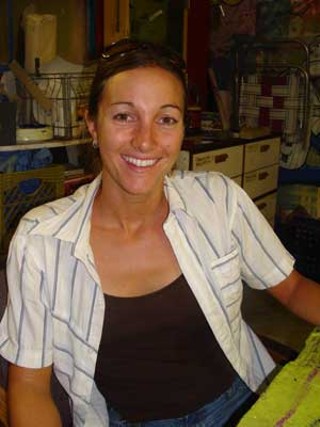Why this increased interest in BICAS?
It seems like a good idea for the Earth to ride a bike, and for your health and all those sort of things. Those have really caught on in Tucson, and we're sensing that here now more than in the past.
What kind of impact does the increased interest have on BICAS?
We've gotten better at serving people. This place has its ebbs and flows, just like any organization. Five years ago, when I first came here, it was likened to a dungeon, and it wasn't user-friendly. We've gotten a lot better at trying to make the place more open, brighten it up and make it more welcome for all people, and not just for one part of our community. I think we are also seeing a much more diverse clientele of people.
What are those people looking for when they come to BICAS?
It ranges: "Hey, I heard about this cool funky space, and I want to check it out." We certainly have people who know this place and use it on a regular basis to fix up their bike or be able to earn time to work on their bikes. We have a strong work-trade program. Someone can come here and put in a few hours to buy parts they need for their bike or hours they need to fix their bikes. We wouldn't function without those people coming in. A lot of those work-traders are homeless people, and kids who have gotten into trouble and have had community-service hours. They get hooked, and then they say, "Hey, I want to earn a bike now," and they turn into work-traders.
Nowadays, those groups are changing, right?
Now a lot of college kids come down here to fix up their bikes and stuff like that, and we've got people from the foothills who come in, and they're looking for this rare part. That's sort of exciting, because you have all these different people coming together in one space, and also we're all working together, like, "Hey, if you're not real busy, this guy is looking for this part." A homeless guy in his 60s has been coming down for years; he knows the place, and he ends up working with this woman from the foothills. You sort of bridge these gaps that we see in society. That's what I've always loved about this place.
What you love has also grown into another nonprofit: El Grupo.
Yes. It started as a BICAS thing, but has been growing the last four years as a youth-cycling club. It started as a fitness elective with City High School, but now has really taken off. At the end of that first year, the kids wanted to ride on the weekends, so we did, and trained for El Tour de Tucson and the Tour de Tucson Mountains. And then they wanted to do bike tours, so we have done that, too. Some of the kids wanted to try racing, and have loved it, so (last weekend), for the first time, we had four kids go to Globe for the Arizona State (Road Race) Championship. Two are 18, and two others are 11 and 12 years old. We want to continue to target those kids who don't really fit in, and don't really want to play football, baseball or even soccer.
Sometimes we hear that Tucson needs improvement to be considered bicycle-friendly. What's your take?
I think we're doing an OK job in terms of education and getting people on bikes. In terms of what Pima County and BICAS is doing, safety education is awesome. We have classes every week, and there are 15 people in that class every week. We can use more help in enforcement and motorist education. Some motorists don't know they are making cyclists feel uncomfortable, honking at them to let them know that they are there. It's not really malicious. I realize that not all cyclists obey all the rules, but I think in terms of enforcement (with motorists), there is a lot more that could be done, and I think we are moving in that direction.





